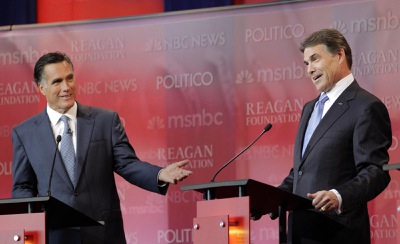
Charles Dharapak / Associated Press
Republican presidential candidate Texas Gov. Rick Perry makes a campaign stop Tuesday at the Iowa 80 Group in Walcott, Iowa.
Friday, Sept. 9, 2011 | 2 a.m.
Sun coverage
Rick Perry describes Social Security as a “violent” attack on core American values. He says Sarah Palin may have been right that the Affordable Care Act created death panels. He says it was “unprincipled” to establish the Homeland Security Department.
That’s not the provocative, distorted language of a 2012 attack ad — at least, not yet. Rather, those are words right out of the Texas governor’s 2010 book, “Fed Up!” — a slim volume that may be one of the biggest gifts ever given to the opponents of a presidential candidate.
It’s a treasure trove of oppo research, a target so ripe that Perry himself pointed to it last year as prime evidence he wasn’t interested in running for president.
“I wouldn’t have written that book if I was going to run for the presidency of the United States,” he said in one national interview.
On that point, Democrats and Republicans agree: There’s little upside for Perry in a book that’s chock full of incendiary statements about everything from entitlement programs to the Homeland Security Department and the Supreme Court.
Ty Matsdorf, communications director for the Democratic research group American Bridge, said the book shows Perry “laying out what any sane or rational candidate wouldn’t even dream of saying.”
“This is what he put down and there’s no backing away from it,” Matsdorf said. “I don’t think a national candidate would, in their worst nightmare, ever think about having this stuff out there.”
Small chunks of “Fed Up!” have already entered the political bloodstream, such as Perry’s description of Social Security as a “Ponzi scheme” and his talk of repealing the 16th Amendment, which permits a national income tax.
But that only scratches the surface of what’s inside Perry’s book, which is essentially a 185-page manifesto in favor of states’ rights and a dramatically scaled-back federal government. The strong ideological bent of the book isn’t necessarily the problem — it’s the sharp language and its exquisite suitability for attack ads that makes it so potentially dangerous to his candidacy, especially in a general election.
Perry faults Republicans for taking an “unprincipled” stance by voting in the wake of Sept. 11 to create the Homeland Security Department, which he criticizes for its “massive” scale. (In the 2002 campaign, it was some Democrats who found themselves on the defensive for opposing the creation of the Homeland Security Department.)
He takes a prominent shot at the Medicare Part D drug benefit, a popular entitlement among senior citizens that was implemented by President George W. Bush and a Republican Congress, saying it “just expanded a broken program.”
In addition to describing the 16th Amendment as a “milestone on the road to serfdom,” Perry takes aim at the 17th Amendment, which allows the direct election of senators, as a measure that promoted fiscal irresponsibility.
Then there’s the section on Social Security, which strategists in both parties believe could be lethal in a primary or November election. In a riff that lasts several pages, Perry calls Social Security the “best example” of New Deal-era programs that “violently toss(ed) aside any respect for our founding principles of federalism and limited government.”
“Ponzi schemes — like the one that sent Bernard Madoff to prison — are illegal in this country for a reason,” Perry wrote. “By any measure, Social Security is a failure.”
The “Ponzi scheme” terminology has been used by other Republicans, including several who won competitive elections in the 2010 cycle. And the fiscal woes of Social Security are well documented.
But it’s the ferocity of Perry’s language that creates a potentially serious problem for him, especially in a campaign that’s expected to hinge on senior-heavy Florida.
In some respects, Perry is caught between two bad options in dealing with the book: He can either embrace its contents and reaffirm a set of controversial, guaranteed-to-inflame views, or back away from them and risk looking like a flip-flopper.
So far, he hasn’t done either.
Perry campaign spokesman Mark Miner declined to address specific passages in Perry’s book, but said that “Fed Up!” represents the “governor’s view of how our nation got into the mess we find ourselves in today and reflects his understanding of what the role of government should look like in our lives.”
“The governor touches on numerous issues of the day and raises a number of ideas — all of which were designed to foster discussion and to encourage his fellow Americans to think about how we choose to govern ourselves,” he said.
Miner continued, again describing the book as a window into Perry’s larger philosophy: “In short, in stark contrast to the current administration, the governor trusts the American people to govern themselves and believes government should be as close to the people as possible. It is this perspective that will guide the governor’s thinking as he lays out his plans to get America working again.”
Although it’s Perry’s name on the cover of “Fed Up!,” it’s actually not clear which sections of the book Perry composed himself. There are five people listed in the acknowledgments section as contributors, including a former U.S. attorney who is said to have “devoted himself full time to the completion of the original manuscript.” Also listed is Dave Carney, Perry’s senior political strategist.
But regardless of how many words Perry personally wrote, some Republicans think he will eventually need to give clearer answers on the views that “Fed Up!” attaches to his name, or risk giving his opponents free rein to hammer him with them.
“This is just a really, really long paper trail and it’s one that was written for an entirely different purpose than a presidential election,” said Dan Schnur, a former adviser to John McCain’s presidential campaign who is now director of USC’s Unruh Institute of Politics. “Just as Romney has to convince voters that he feels differently now than he did when he was governor of Massachusetts … Perry needs to find a way to explain to people that some of these more provocative (statements) don’t represent his current thinking.”
But that approach carries its own set of risks, since it could compromise Perry’s image as a safety-off, guns-blazing straight talker.
Although the book could make Perry “look too radical or too irrational,” New Hampshire strategist Mike Dennehy said, Perry could “make the situation worse by running away from it. I think the right move would be to embrace it and say, ‘I’m not going to be afraid to speak my mind.’ ”
Democrats are hoping that Perry will do exactly that, allowing the party to use “Fed Up!” to define the ascendant GOP hopeful as well outside the political mainstream.
Beyond Perry’s criticism of specific government programs, there are also broad-stroke attacks on government involvement in everything “from housing to public television, from environment to art, from education to medical care, from public transportation to food.”
Some of those things sound an awful lot like programs that swing voters aren’t that exercised over, such as the Corporation for Public Broadcasting and the Food and Drug Administration.
There are statements that simply sound more on the fringe than one would expect from a typical presidential candidate, including one passage in which Perry defends Palin’s charge that the Democratic-backed health care reform law could allow for “death panels.”
“But is she wrong?” Perry says. “Sure, there isn’t a section titled ‘death panels’ in the law, but that’s not how the statist works.”
In a long section on what he deems to be overreach by the Supreme Court, Perry warns darkly that gay marriage “will soon be the policy of the United States … because judges will declare it so.”
He blasts the court for striking down a Texas law banning “homosexual sodomy” in Lawrence v. Texas. And he takes aim at the court for affirming that federal authority over interstate commerce allows Congress to override a medical marijuana law in California.
On top of all that, the book also contains jabs at specific Republican political figures, including Sens. Lindsey Graham of South Carolina and Lisa Murkowski of Alaska, both of whom Perry deems insufficiently conservative — and with whom he’d have to work as president.
Although most of “Fed Up!” is written in a brash, aggressive tone, there is one section that could actually constrain Perry’s ability to go on the attack in 2012.
Early on in the book, in a chapter praising federalism, Perry acknowledges that a system of weak central government means a state such as “Massachusetts is free to experiment with state-run health care.”
Part of the beauty of states, Perry says, is that Americans can live with people “of like mind,” so “the people of Massachusetts are free to try” the universal health care law Mitt Romney implemented, “while the rest of the nation sits back and watches if they have any success, and whether any success they do have is worth the price of losing liberty to get it.”
That happens to be a more sarcastic spin on the 10th Amendment-themed defense Romney has been giving for the law known as “Romneycare,” potentially giving the former Massachusetts governor a way to dodge health care-themed attacks from Perry.
For the most part, though, the book shows Perry in full bomb-throwing mode, and has left Democrats agog at the wealth of material they’ll have at their fingertips if Perry turns out to be the GOP nominee.
“Speaking from an opposition research perspective, if you wanted to pin someone down on their extreme views on Social Security, you would have to go to, you know, the University of Texas video archive and find the debate from his first state house campaign where he gives this outrageous quote on Social Security,” said Judd Legum, who was research director for Hillary Clinton’s 2008 campaign. “Here, he put out a book … where he just lays it out very specifically.”



Join the Discussion:
Check this out for a full explanation of our conversion to the LiveFyre commenting system and instructions on how to sign up for an account.
Full comments policy